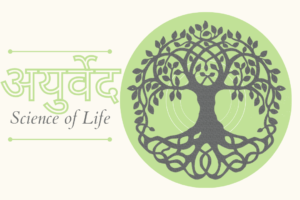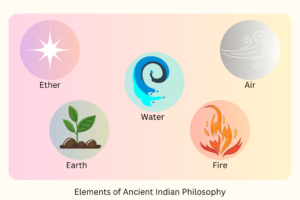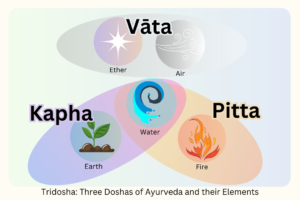अयुर्वेद: Āyurveda
Pronounced aah.yur.VEY.duh
Ayurveda is a system of healing that has its roots in ancient India. It is thought by many scholars to be the oldest healing system extant on our planet.
–Vassant Dattatray Lad, M.A.Sc.
The following is paraphrased from The Textbook of Ayurveda, cited below.
In Sanskrit, āyur means life and veda means knowledge. Āyurveda is often translated as “The Science of Life.”
Āyurvedic philosophy is based on Six Philosophies developed by ancient sages and scriptures of India. Many of these scriptures are known as Vedas, or bodies of knowledge. The four main Vedas — Rigveda, Yajurveda, Arthavaveda, and Sāmveda — are among the oldest bodies of recorded/written knowledge known to human culture. They are difficult to date, but scholars estimate they are more than 10,000 years old.
In the philosophies of ancient Inida, the cosmos is an interplay of the energies of 5 elements: Ether, Air, Fire, Water, and Earth.
Āuyrveda groups these energies into three functional principals present in everybody and everything: these are the three DOSHAS. Ether with air, water with fire, and water with earth comprise these three biochracteristics. When these principals are in balance, they maintain healthy mind and body. in mind and body occurs. As soon as they are out of balance, they pollute bodily tissues and become impurity.
These principals are KAPHA, VĀTA and PITTA. They bind the five elements into living flesh. Vāta is the energy of movement, Pitta is the energy of transformation, and Kapha is the energy of structure.
Vāta governs movement in the body: breathing, blinking, pulse, heartbeat, and cellular activity, etc. Its attributes are DRY, LIGHT, COLD, ROUGH, SUBTLE and CLEAR.
Kapha constitutes the mass of the body: provides water, warms joints, softens skin, maintains immunity. Its attributes are HEAVY, SLOW, OILY, and SOFT.
Pitta directs transformation in the body: absorption, kinesthetics, metabolism, temperature. Its attributes are HOT, SHARP, LIQUID, and MOBILE.
What dosha are you connected to the most? Take our quiz: What’s My Dosha? to find out! Knowing your dosha is a key starting point for understanding how to utilize the healing system of Ayurveda.
The practical, philosophical, and spiritual applications of Ayurveda offers understanding of one’s own unique body, mind, consciousness. Self-knowledge provides a reliable path for ongoing health and happiness. Ayurveda’s broad scope and focus on individuality makes it uniquely capable of suggesting treatment regimen that is highly specialized for each person. It’s a “living science” incorporates modern developments and techniques.
Ayurveda includes knowledge about nature, scope and purpose of life, including both metaphysical and physical and engaging the interaction between the two. Health and disease, happiness and sorrow, pain and pleasure are all discussed in Ayurvedic systems. Life is conceptualized as a conjunction of body, mind, and spirit. The purpose of life defined by Ayurveda is to realize your true essence, this expressing divinity in daily life.
More information about the history of Āyurveda…
Āyurveda, along with other teachings of the time, was an oral tradition. For a long time, sages did not write the practices down, but lived and experienced them, passing them to their students to then teach. Lord Brahmā taught Prajāpati, who passed the wisdom to, Āstreya, who taught Agnivesa, who wrote the first major Āyurvedic treatise in the 5th century B.C.E., which is no longer in existence. The Charaka Samhitā, complied around 400 C.E., is the oldest ancient Sanskrit Āyrvedic text still in existence. The principals of Ayurveda are woven into a philosophy of direct perception: love of truth, known as Darshan.
References
Lad, Vasant. Textbook of Ayurveda, Fundamental Principles. The Ayurvedic Press, Albuquerque, 2002.
5/31/24




